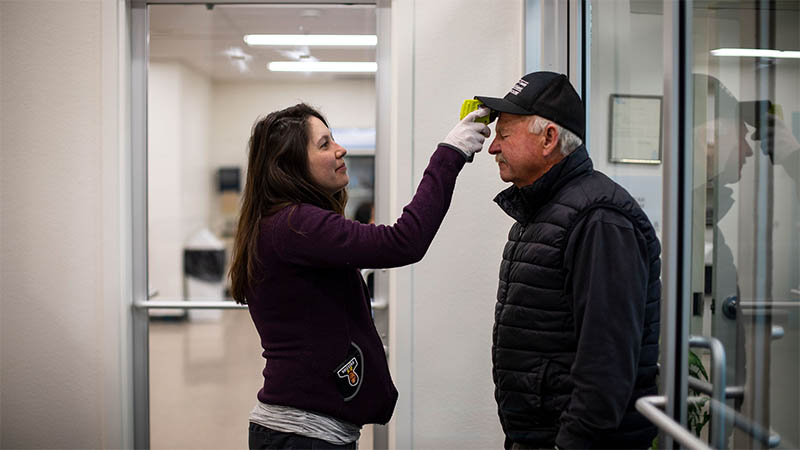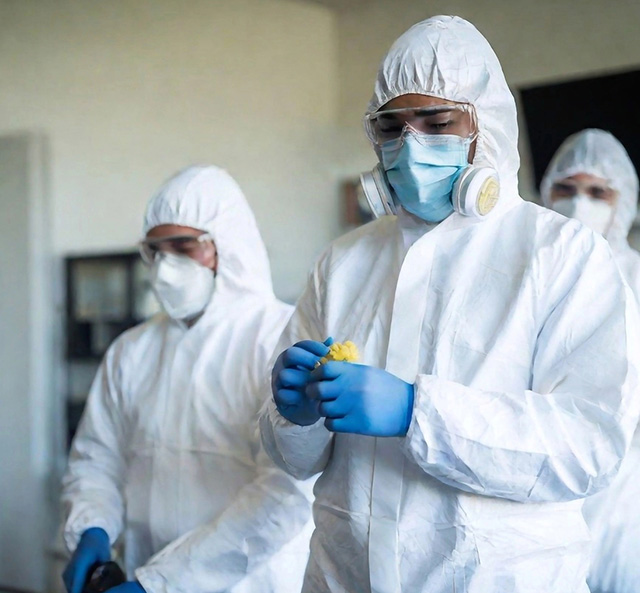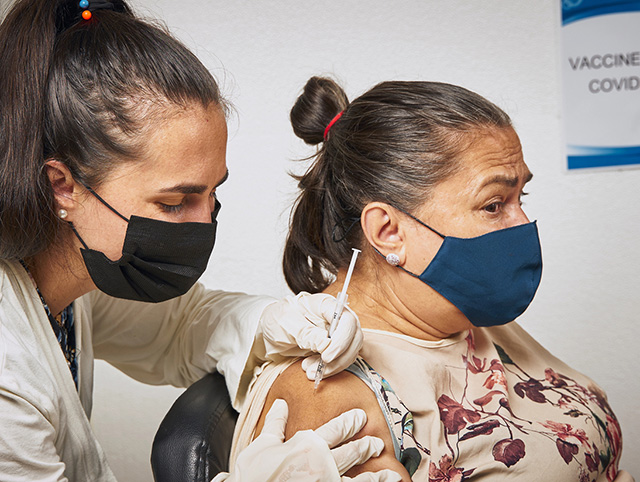Credits required
45
Cost per-credit*
$730
Delivery
Online
Start Terms
Rolling
Lead community change through data-driven public health strategies—on your schedule, from anywhere.
Request Information
45
$730
Online
Rolling

Advance your public health career with the University of Nevada, Reno’s Master of Public Health. This CEPH-accredited program equips professionals like you to respond to today’s complex health challenges—locally, nationally, and globally—through focused, research-driven leadership.
Applications accepted on a rolling basis up to 6 weeks prior to the term start date on a seat available basis. See the academic calendar
This program prepares you to lead from the start. You’ll build the skills to analyze data, shape policy, and communicate with impact—guided by faculty who bring real-world experience into every course. The program emphasizes three core areas:
![]()
Learn how to gather, interpret, and act on public health data using foundational skills in epidemiology, biostatistics, and behavioral science. These tools guide real decisions with measurable impact.
![]()
Build the ability to analyze public health policies and translate complex ideas into messages that inspire change. You’ll practice advocacy, stakeholder engagement, and policy development.
![]()
Engage in hands-on research that directly serves communities. You’ll explore pressing public health issues, generate new insights, and develop solutions grounded in real-world evidence.

You don’t have to pause your career to earn your MPH. Our fully online format gives you the freedom to complete your coursework on your schedule—without sacrificing quality or connection. You’ll stay engaged through collaborative projects, live discussions, and applied work that fits your goals.
The program follows three 14-week terms per year. Most students finish in about two years, though your timeline can flex based on your schedule. You’ll move through the curriculum one course at a time, building depth with each term.
While job titles and salaries vary by region and experience, the skills gained from a master's in public health provide a competitive edge in today’s interconnected business and media landscape.
| Company | Total Postings (Sep 2023 - Sep 2024) | Unique Postings (Sep 2023 - Sep 2024) | Median Posting Duration |
| Kaiser Permanente | 406 | 125 | 25 days |
| University of California | 285 | 88 | 26 days |
| Humana | 163 | 87 | 24 days |
| Providence | 271 | 76 | 13 days |
| Molina Healthcare | 119 | 60 | 26 days |
| Alameda Health System | 168 | 57 | 16 days |
| State of Washington | 63 | 34 | n/a |
Statistics provided for the region including: Arizona, California, Colorado, Idaho, Montana, Nevada, Oregon, Utah and Washington.
To enroll in the online public health master's program, applicants must have completed a four-year bachelor's degree from an accredited institution and meet minimum GPA requirements.

Through our extensive online MPH in Public Health Practice curriculum, future public health practitioners, educators and leaders can develop broad, research-based knowledge of public health, policy and practice. This 45-credit program focusing on general public health practice consists of:
Core Curriculum
21 Credits
Hours Specialization
12 Credits
Electives
6 Credits
Practicum
3 Credits
Capstone
3 Credits
Introduction to research design and methodology for public health.
This course explores the role of cultural, behavioral and social dynamics in public health research, theory, and practice.
Principles and methods of descriptive and analytic epidemiology with an emphasis on critical examination of current public health research.
Focuses on health and wellness relationships, ranging from the individual to the global, with emphasis on the environment and its impact on human health.
Introduces public health graduate students to health policy and the policy making process at the federal, state, and local levels in the US. It emphasizes the role of stakeholders as well as the role of evidence and ethics in creating policy.
Investigates the impact that individuals, groups, structure, and leadership have on behavior within organizations. Application of this knowledge is used for advancing the effectiveness of health services.
Introduction to the underlying principles of biostatistics and a variety of statistical applications in public health research.
This course covers concepts and practical aspects of program development in public health practice.
This course presents the fundamentals of public health finance. Areas of study cover aspects related to planning, operating, and sustaining viable public health programs or departments. Topics include accounting principles, budgeting, financial reporting, funding streams, economic prevention and effectiveness, and grant writing and management. Students will become familiar with public health funding sources as well as planning, monitoring, controlling, and reporting financial status.
Methods and practice of epidemiologic surveillance including theory, practice, field work and computer software application.
Focuses on public health information systems and management of public health data.
A practical introduction to geographic information systems (GIS) and spatial analysis in public health focusing on applications and drawing on a range of examples, including vector-borne and infectious diseases and non-infectious conditions. The range of spatial methodologies and GIS techniques used in public health today are covered in a manner that gives direct comparison of the various techniques and helps to demonstrate their comparative strengths and weaknesses.
Introduces the core concepts, basic elements, and practical applications of project management principles in public health. Covers the most popular software tools available to project managers in public health organizations and how to overcome organizational challenges from stakeholders when introducing and implementing project management practices within an organization.
Introduction to the concepts of public health emergency preparedness, with a focus on the capability standards designed to advance emergency preparedness and response capacity of public health systems.
An exploration of legal and ethical issues in the practice of public health. Reviews the legal foundations of the government’s public health powers and examines the tension between public health activities and individual civil liberties, property rights, commercial speech, and other legally protected interests as well as laws designed to regulate behavior.
All students earning a graduate degree in public health require field studies. It allows each student to apply what they are learning in the didactic courses to real-world experience in a public health setting and develop valuable professional and leadership skills, all while completing a graduate project. The field experience is a minimum of 150 hours completed over three consecutive semesters. The scope of the graduate project varies from student to student based on the host site's agency, institution, or organizational needs, the student’s previous experience, career goals, and specific area of interest in public health.
Required of all MPH students, this culminating experience requires students to synthesize and integrate foundational and concentration competencies through professional development, a professional paper, and a final presentation. This course is cross-listed with MED 695 for medical students. (CHS 796 and MED 695 are cross-listed; credit may be earned in one of the two.)
Supervised field experience in health and wellness settings.
The Online Master of Public Health gives you the tools and flexibility to get there. Whether you're pivoting careers or deepening your impact, this program moves with you—and moves you forward. This isn’t just a degree. It’s a public health mission, backed by science, community, and purpose.
Classes taught by University of Nevada, Reno faculty
Access to a Carnegie® R1 research university
Choose from accessible, fully online programs
Continue your education from anywhere in the world, free from a fixed schedule
The GPA requirements for a Master of Public Health (MPH) program vary depending on the specific university and program. Generally, a competitive GPA is typically 3.0 or higher. Some programs may have higher GPA requirements, while others may consider factors beyond GPA, such as work experience, research experience, and letters of recommendation.
Yes, an online MPH can be highly valuable. It offers flexibility for working professionals and individuals with other commitments, allowing them to pursue advanced education while maintaining their current responsibilities. Online programs provide access to high-quality education from reputable institutions, expanding career opportunities and increasing earning potential. An MPH can equip you with the knowledge and skills to address critical public health challenges, contribute to improving community health, and advance your career in a growing and impactful field.
Online MPH programs offer several advantages, including the following:
The "best" option depends on your individual learning style, career goals, and personal circumstances. Factors to consider include:
Master of Public Health (MPH): A broad-based degree that provides a comprehensive understanding of public health principles, including epidemiology, biostatistics, environmental health, health policy, and health behavior.
Master of Public Health Education (MPHE): Focuses specifically on health education and health promotion. This degree emphasizes skills in program planning, implementation, and evaluation, with a strong emphasis on community-based health education interventions.
Pros:
Cons:
Individuals with an MPH can pursue a wide range of careers in the public and private sectors, including the following: